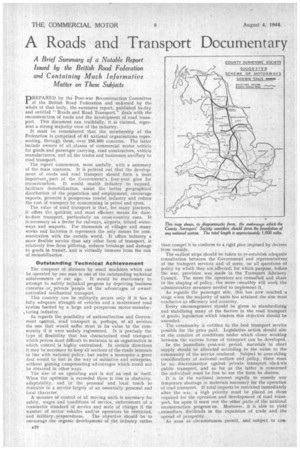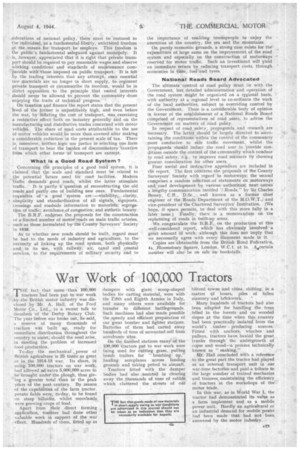A Roads and Transport Documentary
Page 24

Page 25

If you've noticed an error in this article please click here to report it so we can fix it.
A Brief Summary of a Notable Report Issued by the British Road Federation and Containing Much Informative Matter on These Subjects
PREPARED by the Post-war Reconstruction Committee of the British Road Federation and endorsed by the whole of that body, the extensive report, published to-day and entitled " Roads and Road Transport," deals with the reconstruction of roads and the development of road transport. This document can truthfully,' it .is claimed, represent a strong majority view of the industry.
It must be remembered that the membership of the Federation is comprised of 61 national organizations representing, through them, over 250,000 concerns. The latter include owners of all _classes of commercial motor vehicle for goods and passenger carrying, road constructors, vehicle manufacturers, and all the trades and businesses ancillary to road transport.
The report commences, most usefully, with a summary of the main contents. It is pointed out that the development of roads and road transport should form a most importantepart of the Government's four-year plan for reconstruction. It would enable industry to expand. facilitate demobilization, assist the better geographical distribution of the population and employment, encourage exports, promote a prosperous tourist industry and reduce the cost of transport by economizing in petrol and teres.
The, value of road transport is that, for many journeys, it offers the quickest and most efficient means for doorto-door transport, particularly on cross-country runs, It is necessary as a feeder for railways, airports, inland waterways and seaports. For thousands of villages and many works and factories it represents the only means for communication with the outside world. It offers industry a more flexible service than any other form of transport, is relatively free from pilfering, reduces breakage and damage to goods in transit, and is virteally immune from the risk of immobilization.
Outstanding Technical Achievement The conquest of distance by small machines which can be operated by one man is one of the outstanding technical
achievements of our age. It would be reactionary to attempt to nullify technical progress by depriving business concerns or private -people of the advantages of ownet'controlled mechanical transport.
This country can be militarily secure only if it has a fully adequate strength of vehicles and a modernized road system, backed by a large and prosperous motor-manufacturing industry.
As regards the possibility of nationalization and Govern. ment central, road transport is, perhaps, of all services the one that would suffer most in its value to the community if it were unduly regimented. It is precisely the type of flexibility that has characterized road transport which proves most difficult to maintain in an organization in which control is highly centralized. In certain directions it may be necessary to keep all sections of the roads interests in line with national policy, but under a monopoly a great deal would be lost in the way of initiative and enterprise, without gaining compensating advantages which could not be obtained in other ways.
The size of an operating unit is not' an end in itself. When the optimum is exceeded there is loss in elasticity, adaptability, and in ' the personal and local touch 'eo desirable in a service largely of an essentially personal and local character.
A measure of control of all moving units is necessary for safety, wages and conditions of service, enforcement of a reasonable standard of service and scale of charges if the number of motor vehicles and/or operators he restricted, and military, preparedness. The objective should be' to encourage the organic development of the industry rather than compel it to conform to a rigid plan imposed by decrees from outside. .• The earliest steps should be taken to re-establish adequate consultation between the Government and representatives of the transport services and of .users, on all questions of policy by which they are affected; for which purpose, before the war, provision was made in the Transport Advisory Council. The more the operators are consulted and share in the shaping of policy, the more rmoothly will work the administrative measures needed to implement it, As regards the passenger side, this has now reached a stage when the majority of units has attained the size most conducive to efficiency and economy.
Every encouragement should be given to standardizing and stabilizing many of the factors in the road transport of goods; legislation which hinders this objective should be amended.
The community is entitled to the best transport service possible for the price paid. Legislative action should aim at the creation of conditions under which closer working between the various forms of transport can be developed.
In the immediate post-war period, materials in short supply should be allocated according to the value to the community of the service rendered. Subject to over-riding considerations of national welfare and policy, there must be no discrimination against private transport vie-aavis public transport, and so far as the latter is concerned the individual must be free to use the form he desires.
• It is in the national .interest rapidly to remedy any temporary shortage in materials necessary for the operation of road transport. If total imports be restricted immediately after the war, a high priority must be placed on those required for the operation and development of road transport, for upon it must rest the other parts of the national reconstruction programam. Moreover, it is able to yield • -immediate dividends in the expansion of trade and the spread of prosperity. As soon as circumstances permit, and -subject to con..
siderations of national policy, there must be restored to the individual, as a fundamental liberty, unfettered freedom of. the means for transport he employs. This freedom is the public's fundamental safeguard against monopoly. It is, however, appreciated that it is right that private transport should be required to pay reasonable wages and observe working conditions and standards of maintenance comparable with 'those imposed on public transport. It is felt by the trading interests that any attempt, once essential raw materials are no longer in short supply, to regiment private transport or circumscribe its freedom, would be in direct opposition to the principle that vested interests should never be allowed to prevent the community 'from enjoying the fruits of technical progress.
On taxation and finance the report states that the present level of the former is unjustifiably high, and even before the war, by inflating the cost of transport, was exercising a restrictive effect •both on industry generally and on the manufacturing and distributive trades concerned with motor vehicles. The share of road costs attributable to the use of motor vehicles would be more than covered after making a considerable reduction in the present scale of tax. There is, moreover, neither logic nor justice in selecting one form of transport to bear the burden of discriminatory taxation from which other forms of transport are exempt.
What Is a Good Road System ?
Concerning the principles of a good road system, it is claimed that the scale and standard must be related to the potential future need for road facilities. Modern traffic demands good roads, whilst the latter stimulate traffic. It is partly a question of reconstructing the old roads and partly one of building new ones. Fundamental requisites of a good system are :—visibility; clarity, simplicity and standardization of all signals, signposts, crossings and roadside information to motorists; segregation of traffic; avoidance of congestion; and assthetic beauty.
The B.R.F. endorses the proposals for the construction of a limited number of motor roads on main traffic arteries, such as those formulated by the County Surveyors' Society In 1838.
M to whether new roads should be built, regard must he had to the needs of industry and agriculture, to the necessity of linking up the road system, both physically And in its use, with railway, air, canal and coastal services, to the requirements of military security and to
the importance of enabling townspeople to • enjoy the amenities of the country, the sea and the mountains.
On purely economic grounds, a strong case exists for the expenditure of large sums on the improvement of the road system and especially on the construction of motorways reserved for motor traffic. Such an investment will yield an immediate return by reducing transport costs, through economies in time, fuel and tyres.
National Roads Board Advocated
The ultimate control of road policy must lie with the Government, but detailed administration and operation of the road system might be organized on a regional basis, with authority at a regional level to co-ordinate the work of the local authorities, subject to overriding control by the Government. There is a considerable body of opinion in favour of the establishment of a National Roads Board comprised of representatives of road users, to advise the Government on matters of road policy.
In respect of road safety, propaganda and research are necessary. The latter should be largely directed to 'ascertaining the conditions within the control of the 'community most conducive to safe traffic movement, whilst the propaganda should induce the road user to provide conditions outside the control of the community which conduce to road safety, e.g., to improve road manners by showing greater consideration for other users.
Four useful and instructive appendices are included in the report. The first concerns the proposals of the County Surveyors' Society with regard to motorways; the second comprises a random selection .of statements on ,motorways and road development by various authorities; next comes a lengthy communication entitled " Roads," by Sir Charles Bessey, C.B., D.Sc., well known as a former chief engineer of the Roads Department of the M.O.W.T„ and vice-president of the Chartered Surveyors' Institution. (We hope, if space permits, to deal with this more fully in a later issue.) Finally, there • is a memorandum on the replanning of roads in built-up areas.
We congratulate the B.R.F. on the production of this well-considered report, which has obviously involved a great amount Of work, although this does not imply that we necessarily agree with every statement made in it.
Copies are obtainable from the British Road Federation, 4a, Bloomsbury Square, London, W.C.1, at Is. Ascertain number will also be on sale on bookstalls.




















































